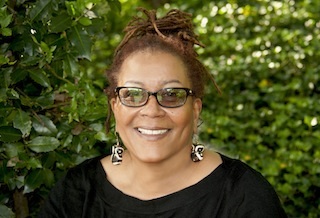
Interview with Breena Clarke
Breena Clarke is the author of River, Cross My Heart (which I reviewed earlier), Angels Make Their Hope Here
, and Stand the Storm
. I was thrilled when Breena agreed to be interviewed about the writing of River, Cross My Heart
and about writing historical fiction.
River, Cross My Heart is about the African-American community in the Georgetown neighborhood of Washington, DC during the 1920’s. I know that you grew up in Georgetown, as did your parents. How much of your novel is based on stories told by your family, and how much is made up?
Breena: The impetus for beginning to write River, Cross My Heart came directly as a result of having listened to an oral history that my mother had taped at my request. She and my father grew up in the Georgetown section of Washington, D.C and their memories of the neighborhood were vivid. It was more than facts that they related. They related a sense of community that enforced social segregation made imperative, but that nevertheless was a source of their positive sense of themselves. I regretted that the stories of Washington’s neighborhoods were not known, were not being told. Why not, I wondered? It gave me a lot of energy to galvanize my research work as being necessary, being purposeful.
What did you hope to accomplish with this novel? What did you want readers to come away with?
Breena: Above all, I wanted the reader to feel and empathize with the herculean task of parenting during this period of segregation. I wanted them to feel a young person’s goals and aspirations threatened and destroyed by racism. However, I did want to depict a good and successful life story despite these challenges.
How did your own life impact this novel? (In other words, even though this is a historical novel, did some of your own experiences make their way into the novel?) I ask because the novel seems so immediate, almost autobiographical. It reminds me of Not Without Laughter by Langston Hughes, which is autobiographical.
by Langston Hughes, which is autobiographical.
Breena: I experienced the loss of my only child in an accident. This was a devastating loss to me and my husband and it became the precipitating event that compelled me to write. I’d always wanted to write and had done a fair amount of dramatic writing and journalism. I sincerely wanted to express the profound grief of this child’s death and the impact that a family member’s death can have on an entire family. I began a regular practice of writing my recollection of him. This led directly to my undertaking fiction. I wanted to indulge myself in contemplating my son even if only in an oblique way. I would not consider River, Cross My Heart to be autobiographical, however. None of the events actually occurred.
I’m sorry for the loss of your son, but I’m glad you found your way to fiction. How much research did you do for this novel?
Breena: I undertook a couple of years of poking around and reading as much as possible about Washington in this period. However, I did more digging than I actually needed to. I was very nervous to get facts just right — as right as possible. I had to make myself begin to write down my fictional story and check facts later. That is a point that an historical novelist has to get to, I think. You’ve got to trust that you are solid and then plunge into the fiction.
Jumping from fact to fiction–it sounds like that was difficult for you.
Breena: The hardest part comes when you have to admit that you have done all the research and can no longer use research to keep you from focusing on your fictional story. Research can become a time-waster. One things that helps is the realization that even verifiable facts are open to interpretation, that many historical accounts are fiction-fied.
The characters in this novel seem so real and so unique. Was it difficult to achieve this, or did you have a sense of the characters all along?
Breena: I had quite a few interesting people on which to model my characters. I usually say that each fictional person is a composite of some actual acquaintances. I was most concerned to allow my characters to have a wide range of behaviors. One of the things that annoys me most about some of the great fiction of the past is the complete absence of Black people like the ones I’ve known. Frankly, people of color are not always imaginable by White authors. I wanted to paint their lives in. I’m beyond pleased when readers find my characters unique, but I don’t want them to strain plausibility and seem too eccentric.
You have certainly achieved your goal to “paint their lives in.” Is there anything else about this book that most people are not noticing or commenting on, that you wish readers and reviewers would notice?
Breena: I intend that my characters will challenge the white, Euro-centric construct of the United States, the Americas. I want every reader to approach my work, to take it up, to challenge my text if they need to, but go away from my work knowing that Black is beautiful and smart and brave and hilarious, that people of color do not depend upon the favor of the white gaze for self-actualization.
Are you working on a book of historical fiction now, and if so, would you like to tell us about it?
Breena: I am working on another historically-based novel that will be set mostly in the mid-Atlantic region. I’m thinking about my approach to this account differently. I am using a contemporary narrator, as well as an historical one. First-person voice is a different turn for me.
Thank you, Breena, and good luck with the new novel! Check out her web site at www.BreenaClarke.com